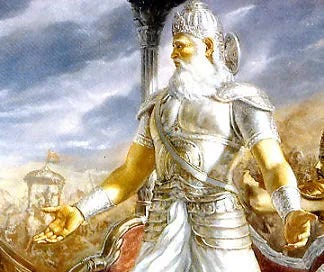Bhishma, the grand patriarch of the Kuru dynasty, is one of the most revered and complex characters in the Mahabharata. Renowned for his valor, wisdom, and devotion, his life was shaped by unyielding vows that ultimately dictated his fate.
The Vow That Defined His Life
Bhishma’s defining moment came when he took a vow of celibacy and renounced his claim to the throne, ensuring that his father, King Shantanu, could marry Satyavati. This pledge of unwavering loyalty to the throne earned him the boon of Ichha Mrityu (the ability to choose the time of his death) but also became the source of his struggles.
Loyalty and Duty Above All
As the commander of the Kaurava army in the Kurukshetra War, Bhishma remained loyal to the throne despite recognizing Duryodhana’s unrighteousness. His strict adherence to duty prevented him from actively opposing Adharma, highlighting the conflict between personal values and societal obligations.
The Tragic Consequences of His Oaths
Bhishma’s rigid adherence to his promises led to several key tragedies:
He stood by as Draupadi was humiliated, unable to intervene despite his moral compass.
His loyalty to the Kauravas forced him into a war he did not believe in.
His inability to break his vow ultimately resulted in his downfall at the hands of Arjuna, using Shikhandi as a shield.
Bhishma’s Legacy
Even in his final moments, Bhishma imparted wisdom to Yudhishthira on governance and righteousness, leaving behind a legacy of sacrifice, duty, and honor. His life teaches the importance of balance between duty and moral responsibility, a lesson that remains relevant even today.
Bhishma’s story is a powerful reflection on the weight of promises, the complexities of Dharma, and the tragic consequences of unwavering loyalty.
For any complaints or removal requests regarding the content I've generated, please use the contact form provided at: https://www.inderneilk.com/contactus




